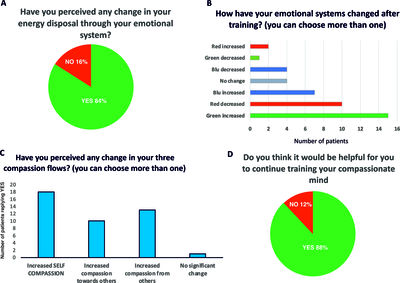Morte, SD; Berti, E; Lalli, C; Modugno, N; Morgante, F; Schrag, A; Makovac, E; Ricciardi, L
(2024)
Compassionate mind training for people with Parkinson's disease: A pilot study and predictors of response.
Eur J Neurol, 31 (7).
e16286.
ISSN 1468-1331
https://doi.org/10.1111/ene.16286
SGUL Authors: Morgante, Francesca
|
PDF
Published Version
Available under License Creative Commons Attribution Non-commercial No Derivatives. Download (2MB) | Preview |
|
|
Microsoft Word (.docx) (Data S1)
Supplemental Material
Download (21kB) |
||
![[img]](https://openaccess.sgul.ac.uk/116361/8.hassmallThumbnailVersion/ene16286-sup-0002-figures1.jpeg)
|
Image (JPEG) (Figure S1)
Supplemental Material
Download (3MB) | Preview |
Abstract
INTRODUCTION: People with Parkinson's disease (PD) often present with disabling neuropsychiatric symptoms. Compassionate mind training (CMT) is a psychological approach effective in reducing stress and promoting psychological well-being. Heart rate variability (HRV), a measure reflecting sympathovagal balance, has been associated with psychological well-being and a compassionate attitude. AIM: To assess the feasibility and effectiveness of CMT in enhancing the quality of life and psychological well-being in PD patients. Additionally, we evaluated HRV as a physiomarker for assessing the CMT outcomes. METHODS: Twenty-four PD patients participated in the study. A 6-week online CMT intervention was delivered on a weekly basis. At baseline and post-intervention patients completed questionnaires assessing depression, anxiety and quality of life. In a subsample of 11 patients, HRV was measured at baseline and post-intervention in three conditions: at rest, during stress and after 3 min of deep breathing. RESULTS: The attendance rate was 94.3%. Quality of life and perceived stigma improved post-intervention as compared with baseline (p = 0.02 and p = 0.03 for PD Questionnaire-39 total score and Stigma subscore, respectively). After CMT, patients presented better physiological regulation to stress, as measured by higher HRV as compared with baseline (p = 0.005). Notably, patients who were more resilient to stress at baseline (less decrease in HRV during stress) experienced a more substantial reduction in anxiety and depression following CMT. CONCLUSIONS: CMT is feasible and can improve quality of life and stigma in PD patients. HRV emerges as a promising physiomarker for predicting and measuring the outcomes of psychological interventions in PD.
| Item Type: | Article |
|---|---|
| Additional Information: | © 2024 The Authors. European Journal of Neurology published by John Wiley & Sons Ltd on behalf of European Academy of Neurology. This is an open access article under the terms of the Creative Commons Attribution-NonCommercial-NoDerivs License (http://creativecommons.org/licenses/by-nc-nd/4.0/), which permits use and distribution in any medium, provided the original work is properly cited, the use is non-commercial and no modifications or adaptations are made. |
| Keywords: | Parkinson's disease, compassion, heart rate variability, neuropsychiatric symptoms, stigma, 1103 Clinical Sciences, 1109 Neurosciences, Neurology & Neurosurgery |
| Journal or Publication Title: | Eur J Neurol |
| ISSN: | 1468-1331 |
| Language: | eng |
| Publisher License: | Creative Commons: Attribution-Noncommercial-No Derivative Works 4.0 |
| PubMed ID: | 38520186 |
 |
Go to PubMed abstract |
| URI: | https://openaccess.sgul.ac.uk/id/eprint/116361 |
| Publisher's version: | https://doi.org/10.1111/ene.16286 |
Statistics
Actions (login required)
 |
Edit Item |


